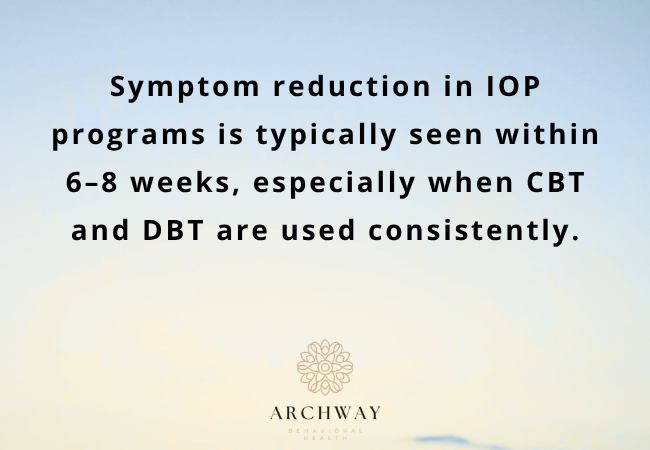Mental health conditions can affect every aspect of daily life—your mood, relationships, job, academic performance, and overall well-being. But not everyone needs or wants inpatient hospitalization to heal. For many, Partial Hospitalization Programs (PHP) and Intensive Outpatient Programs (IOP) provide the right balance of support, structure, and flexibility.
Choosing between PHP and IOP may seem confusing at first, especially if you or a loved one are trying to determine how much care is needed. The key is understanding the level of intensity, time commitment, and therapeutic components that each program offers.
At Archway Behavioral Health, we offer both PHP and IOP as part of our comprehensive mental health treatments in Florida—backed by licensed clinicians, evidence-based therapies, and a compassionate community focused on long-term healing.
What Is a Partial Hospitalization Program (PHP)?
A Partial Hospitalization Program is often considered the highest level of outpatient mental health care. It’s ideal for individuals who require a structured environment and frequent support but do not need 24/7 supervision in an inpatient or hospital setting.
Key Features of PHP:
- Treatment 5 to 6 days a week, typically for 6–8 hours per day
- Daily individual therapy in Florida and group therapy in Florida
- Psychiatric care including medication evaluation and ongoing management
- Skills training sessions, mindfulness work, and psychoeducation
- Focused support for anxiety treatment in Florida, bipolar treatment in Florida, trauma recovery, and co-occurring conditions
Who PHP Is Best For:
- Individuals transitioning from inpatient or residential treatment
- Clients at risk of hospitalization or relapse
- Those experiencing severe anxiety, depression, or mood instability
- People who need daily clinical oversight but still wish to live at home
PHP Goals at Archway:
- Stabilize acute mental health symptoms
- Establish a reliable routine and emotional safety
- Equip clients with coping tools before stepping down to IOP or traditional outpatient therapy
What Is an Intensive Outpatient Program (IOP)?
An Intensive Outpatient Program provides structured therapeutic care while allowing individuals to continue with many aspects of their daily life—such as work, school, or caregiving.
IOPs are considered a step-down from PHP but offer significantly more support than once-a-week outpatient sessions.
Key Features of IOP:
- Treatment 3 to 5 days a week, 3–4 hours per day
- Regular individual therapy and group therapy
- Customized treatment plans using CBT and DBT
- Medication support as needed
- Greater flexibility for those balancing life responsibilities
Who IOP Is Best For:
- Clients with mild to moderate symptoms
- Working professionals or students needing flexible scheduling
- People transitioning from PHP who still need structure
- Individuals seeking anxiety treatment, bipolar support, or relapse prevention
IOP Goals at Archway:
- Strengthen emotional regulation and coping strategies
- Foster independence while maintaining therapeutic support
- Prepare for long-term outpatient care or self-managed mental health routines
PHP vs. IOP: A Side-by-Side Breakdown
| Aspect | PHP (Partial Hospitalization Program) | IOP (Intensive Outpatient Program) |
|---|---|---|
| Time Commitment | 6–8 hours/day, 5–6 days/week | 3–4 hours/day, 3–5 days/week |
| Level of Care | High-intensity outpatient | Moderate-intensity outpatient |
| Living Arrangements | Live at home | Live at home |
| Work/School Compatible? | Limited | Yes |
| Therapies Offered | Individual, group, CBT, DBT, medication, life skills | Individual, group, CBT, DBT, medication |
| Ideal For | Severe symptoms, step-down from inpatient, risk of relapse | Moderate symptoms, work/school balance, step-down from PHP |
| Duration | Typically 2–4 weeks | Typically 6–12 weeks |
Core Therapies in Both PHP and IOP at Archway
Whether you choose PHP or IOP, you’ll receive comprehensive, personalized care using proven treatment methods. Each client’s plan is built around their diagnosis, lifestyle, and personal goals.
Individual Therapy in Florida
Meet one-on-one with a licensed therapist to:
- Address root causes of emotional distress
- Develop healthy coping mechanisms
- Set short- and long-term recovery goals
- Work through personal challenges such as grief, trauma, burnout, or relationship issues
Group Therapy in Florida
In group settings, clients gain insight, connection, and practice with:
- Emotional expression and communication
- Self-reflection and interpersonal feedback
- Social skills and conflict resolution
- Topics such as self-worth, shame, boundaries, and stress tolerance
Cognitive Behavioral Therapy in Florida
CBT is a short-term, goal-focused therapy that helps identify and correct negative thinking patterns and behaviors. Ideal for:
- Anxiety disorders
- Depression
- Low self-esteem
- Performance-based stress
Dialectical Behavior Therapy in Florida
DBT emphasizes:
- Emotional regulation
- Mindfulness
- Interpersonal effectiveness
- Tolerance of distressing emotions
DBT is especially valuable for individuals with bipolar disorder, emotional dysregulation, or those with a history of self-harm or intense emotional responses.
Medication Management
Our psychiatric providers collaborate with your therapy team to offer:
- Psychiatric evaluations and medication initiation
- Monitoring and adjustment of dosages
- Symptom tracking in conjunction with therapy goals
Medication is often used to stabilize mood, reduce anxiety, and support the therapeutic process.
Deciding Factors: PHP vs. IOP
Choosing the right level of care depends on symptom severity, daily functioning, and support needs. Here’s how to make the decision easier:
PHP May Be Right For You If:
- You experience frequent emotional crises or thoughts of self-harm
- Your symptoms prevent you from managing basic tasks (hygiene, sleep, nutrition)
- You need daily clinical monitoring to stabilize
- You’ve just left an inpatient or residential treatment program
- You’re facing a relapse or major breakdown in functioning
IOP May Be Right For You If:
- You are functioning but need structured support to avoid relapse or crisis
- You want to continue working or attending school while receiving care
- You’ve made progress in PHP or inpatient and want to step down gradually
- You struggle with recurring anxiety, depression, or bipolar symptoms
- You’re motivated to participate in therapy while managing life obligations
Common Conditions Treated in PHP and IOP
At Archway Behavioral Health, both levels of care are available for a wide range of mental health concerns:
- Anxiety Disorders (GAD, panic disorder, phobias)
- Major Depressive Disorder
- Bipolar I and II Disorders
- PTSD and complex trauma
- Borderline Personality Disorder
- Adjustment Disorders
- Co-occurring substance use disorders
Treatment plans are adjusted regularly based on client progress, medication responses, and therapeutic milestones.

Why the Right Level of Care Matters
Starting at the appropriate level of care ensures:
-
Faster symptom stabilization
-
Lower risk of relapse or crisis
-
Better long-term outcomes
-
Greater engagement in therapy
Trying to “tough it out” at too low a level of care can lead to burnout, worsening symptoms, or avoidable hospitalization. That’s why Archway Behavioral Health takes time to assess your history, lifestyle, and clinical needs to match you with the right program from the start.
Transitioning Between Levels of Care
One of the strengths of receiving treatment at Archway is the continuum of care. Many clients begin in PHP, then transition to IOP as their symptoms improve. Others start directly in IOP and maintain their progress with outpatient therapy long after completing the program.
We help you navigate these transitions with:
- Weekly progress evaluations
- Step-down planning and preparation
- Continued access to group support and individual sessions
- Aftercare and alumni engagement options
Why Choose Archway Behavioral Health?
At Archway, we combine clinical excellence with deep compassion. Our team doesn’t just treat symptoms—we empower people to reclaim control over their lives.
What Sets Us Apart:
- Dual program flexibility: PHP and IOP under one roof
- Licensed therapists with expertise in CBT, DBT, and trauma-informed care
- Comprehensive mental health treatments in Florida
- Supportive individual and group therapy settings
- Custom treatment plans for anxiety, bipolar, depression, and more
- State-of-the-art facilities and warm, welcoming staff
Whether you’re stepping down from crisis or stepping up your self-care, Archway Behavioral Health offers the right program for wherever you are in your journey.
Conclusion
Making the decision to seek mental health treatment is a powerful first step. Whether you’re unsure where to begin or just need clarity between PHP and IOP, we’re here to help. Don’t wait until your symptoms spiral or your functioning breaks down. If you’re unsure which level of care you need, our team can help guide you.
Call Archway Behavioral Health today at 888.488.4103 for a free, confidential assessment. Let’s build a care plan that fits your life—and supports your future.
Frequently Asked Questions (FAQ)
What is the main difference between PHP and IOP?
The primary difference is intensity and time commitment. A Partial Hospitalization Program (PHP) involves 6–8 hours of treatment per day, 5–6 days a week, while an Intensive Outpatient Program (IOP) typically runs 3–4 hours per day, 3–5 days a week.
Who is PHP best suited for?
PHP is ideal for individuals with more acute mental health symptoms who need daily clinical support but do not require inpatient hospitalization. It’s often used as a step-down from inpatient care or as a preventative measure against hospitalization.
Who should consider IOP instead of PHP?
IOP is best for people who are functioning in daily life—such as working, attending school, or caring for family—but still need structured support for conditions like anxiety, depression, or bipolar disorder.
Do PHP and IOP offer the same types of therapy?
Yes. Both programs at Archway Behavioral Health include:
-
Individual Therapy in Florida
-
Group Therapy in Florida
-
Cognitive Behavioral Therapy (CBT)
-
Dialectical Behavior Therapy (DBT)
-
Psychiatric care and medication management
Can I work or go to school while in a PHP or IOP?
It is usually difficult to work or attend school full-time while in PHP due to its time demands. However, IOP is specifically designed to be compatible with a flexible work or school schedule.
How do I know whether I need PHP or IOP?
An assessment with our clinical team can help determine the most appropriate level of care. We consider factors like symptom severity, daily functioning, medical history, and risk of crisis.


